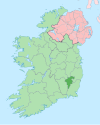Clonegal
Clonegal
Irish: Cluain na nGall | |
|---|---|
Village | |
 Main Street | |
| Coordinates: 52°41′26″N 6°38′43″W / 52.6906°N 6.6453°W | |
| Country | Ireland |
| Province | Leinster |
| County | Carlow |
| Elevation | 83 m (272 ft) |
| Population | 249 |
| Time zone | UTC+0 (WET) |
| • Summer (DST) | UTC-1 (IST (WEST)) |
| Irish Grid Reference | S916607 |
Clonegal, officially Clonegall (/ˈkloʊnəɡɔːl/ KLOH-nə-gawl; from Irish Cluain na nGall, meaning 'meadow of the foreigners'),[2] is a village in the southeast of County Carlow, Ireland. It is in a rural setting, close to the border between counties Wexford and Carlow, 5 km (3 mi) from Bunclody, County Wexford and 22 km (14 mi) from Carlow town. It is just over a mile north of where the River Slaney and the River Derry meet.[3] Clonegal has a much smaller "twin" village across the River Derry in County Wexford, Watch House Village.
The village is served by a primary school, and is the centre of an agricultural hinterland.[3]
History
[edit]

Evidence of ancient settlement in the area includes ringfort, bullaun stone and holy well sites in the surrounding townlands of Clonegall, Abbeydown and Huntington.[4]
Huntington Castle, also known as Clonegal Castle, is a 17th-century tower house close to the village centre.[5] Built by Laurence Esmonde, 1st Baron Esmonde on the site of an earlier (possibly 15th century) structure,[6][7] Huntington Castle was further extended in the 18th and 19th centuries.[5]
Clonegal's Church of Ireland church, St Fiaac's, was built c. 1819 on the site of a much earlier church and ecclesiastical enclosure.[8][3] The nearby rectory, now a private house, was the residence of the local yeomanry commander during the 1798 Rebellion, and several United Irishmen prisoners were reputedly hanged in a neighbouring yard at what is now known locally as the "Hanging Arch".[3]
The local Roman Catholic church, St Brigid's, was built c. 1845.[9]
There were once eleven malt houses in and around the village, along with a wool and corn store, a police station and other shops.[3]
Kildavin/Clonegal GAA club was formed in 1914.[10]
Clonegal won the "tidiest village" category in the 2014 and 2015 National Tidy Towns competitions.[11][12]
Demographics
[edit]According to the 2006 Census, Clonegal had a population of approximately 280, an increase of 20% since the 2002 Census.[3] As of the 2022 census, the population was 249.[1]
Notable people
[edit]- Peter Murphy, radio and television broadcaster, was from the area.[13]
- Patrick O'Donoghue, the 19th century Irish nationalist revolutionary and journalist.[citation needed]
See also
[edit]References
[edit]- ^ a b "Census Interactive Map – Towns: Clonegall". Census 2022. Central Statistics Office. Retrieved 7 December 2024.
- ^ "Cluain na nGall / Clonegall". Placenames Database of Ireland. Retrieved 14 February 2021.
- ^ a b c d e f "Clonegal - Draft Local Area Plan 2007" (PDF). Carlow County Council. Archived from the original (PDF) on 18 November 2007. Retrieved 18 November 2007.
- ^ Archaeological Inventory of County Carlow. Dublin: Government Stationery Office. 1993.
- ^ a b "Huntington Castle, Huntington, Clonegall, Carlow". buildingsofireland.ie. National Inventory of Architectural Heritage. Retrieved 8 May 2021.
- ^ "Carlow Tourism - Clonegal". carlowtourism.com. Archived from the original on 27 May 2006.
- ^ "The doctor who wanted to turn a castle into a mental asylum but blew it up with dynamite". thejournal.ie. Journal Media Ltd. 24 July 2015. Retrieved 8 May 2021.
- ^ "Saint Fiace's Church of Ireland Church, Clonegall, Clonegall, Carlow". buildingsofireland.ie. National Inventory of Architectural Heritage. Retrieved 8 May 2021.
- ^ "Saint Brigid's Catholic Church, Clonegall, Clonegall, Carlow". buildingsofireland.ie. National Inventory of Architectural Heritage. Retrieved 8 May 2021.
- ^ "Kildavin Clonegal GAA Club - About our club". kildavinclonegalgaa.ie. Retrieved 10 March 2024.
- ^ "Clonegal is Ireland's Tidiest Village". carlow-nationalist.ie. Carlow Nationalist. 15 September 2014. Retrieved 8 May 2021.
- ^ "Clonegal is still Tidiest Village in Ireland". kclr96fm.com. CK Broadcasting Ltd. 28 September 2015. Retrieved 8 May 2021.
- ^ "Quizmaster who was one of State's most recognisable broadcasters". irishtimes.com. Irish Times. 11 June 2011. Retrieved 8 May 2021.
Peter Murphy was born near Clonegal, Co Carlow


